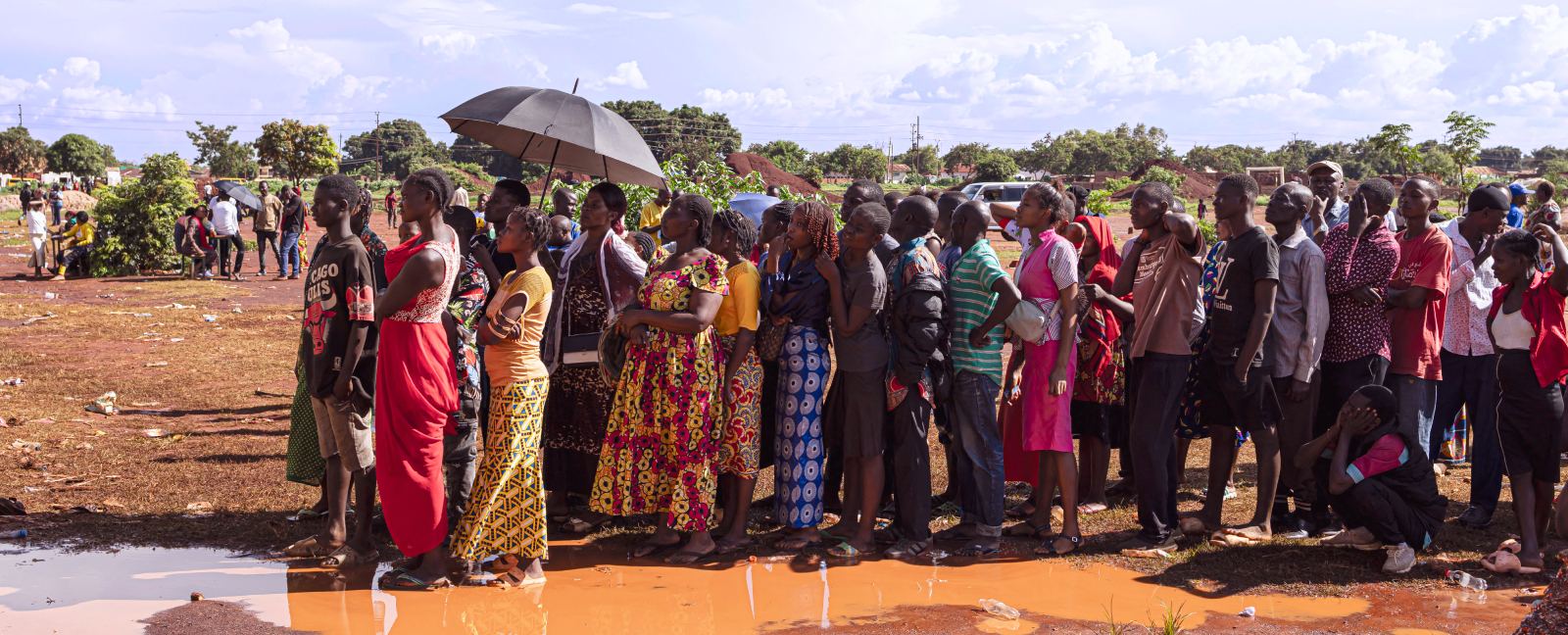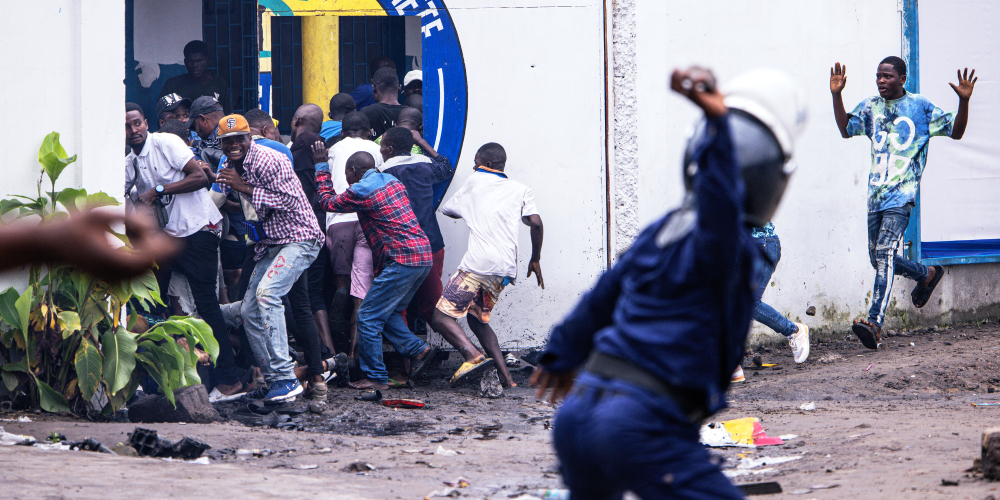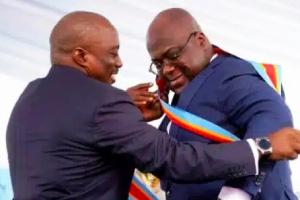
Voters queuing as they wait to cast their ballots at a polling station in Lubumbashi on December 21, 2023. (Photo: AFP/John Wessels)
The Democratic Republic of the Congo’s (DRC) Independent National Electoral Commission (CENI) has declared incumbent President Félix Tshisekedi the winner of the country’s presidential election with 72 percent of the vote. The resounding figure would seem implausible given the strong following of leading opposition candidates and pre-election polling showing no candidate gaining a majority. Moreover, no previous incumbent in the DRC has ever secured more than 48 percent of the vote, even with allegations of widespread fraud.
The electoral process was engulfed in widespread irregularities that made it difficult to validate CENI’s results. While scheduled for December 20, CENI announced a one-day extension given widespread delays. However, voting continued through Christmas Day and did not end until December 27, according to an independent audit by DRC’s respected National Episcopal (Catholic) Conference of the Congo (CENCO). These extensions—illegal under Congolese law—mean no one knows when the polls actually closed.
CENI has not provided a breakdown of votes by voting station and, on January 2, postponed the release of the provisional results of the national and provincial legislative elections as well as those of the municipal councilors. Such jurisdictional data would enable corroboration with the presidential results based on the relative performance of competing party candidates.
Data showed that over 27 percent of the polling stations did not open … and 45 percent of voting machines malfunctioning.
CENCO and the Church of Christ in Congo (CCC)—a union of 62 Protestant denominations—asked CENI to account for these anomalies and provide a breakdown of results per polling station. Their combined 60,000-strong observer mission is the country’s largest ever. Its data showed that over 27 percent of the polling stations did not open at all and catalogued numerous malpractices like 11 percent of all voting machines being placed in military schools and 45 percent of voting machines malfunctioning.
Another local observer, SYMOCEL, found that two-thirds of the polling stations opened late on December 20 (between 1 and 11 hours after the scheduled time for opening). Only 57 percent complied with voting procedures.
Opposition candidates and civil society leaders have called for an annulment and re-run. On December 27, security forces violently broke up a protest against the results. The Catholic Archbishop of Kinshasa, Fridolin Besungu Ambongo, called the polls “a gigantic organized disorder.”
A Chaotic Poll
Congolese churches documented 5,402 reports of serious incidents, 60 percent of which interrupted voting. Their large observer contingent, coupled with past experience, gave them substantial coverage of Congo’s 75,000 polling stations. Their daily reports found numerous shortcomings. Roughly 43 percent of these reports cited missing voter lists, ballot papers, indelible ink, and ineligible voter cards.
Three-quarters of the reports identified malfunctioning voting devices, failure to open polling stations, vote-buying, ransacking of polling material, torn electoral lists, ballot stuffing, and denial of access to local observers.
Revealingly, CENI declared that 44 million people registered to vote in this country of 110 million people, though failed to release the register for review and corroboration, as per best electoral practice. In the 2018 election, only 40 million voters were registered. Still, the turnout for the December election was low—about 43 percent according to CENI—compared to a 67 percent turnout in 2018.

A police officer throws a rock as demonstrators run into an opposition party house on December 27, 2023. (Photo: AFP/ Patrick Meinhardt)
The chaos was particularly aggravating in many opposition strongholds like Katanga, Kisangani, and North Kivu. Complaints were raised about the unequal distribution of voting kits, blank voter cards by government supporters, registration of minors, violence and intimidation by state agents, and poor quality of voter cards—errors that were substantiated by local and foreign observers. Voters in war-ravaged areas in eastern DRC were largely disenfranchised. The government announced that, due to insecurity, displaced people in North Kivu and Ituri—some seven million Congolese —as well as residents in M23-controlled areas, would not vote. CENI has promised to set aside seats of for them in the national and provincial parliaments.
The DRC government refused to accredit observers from the European Union (EU) and East African Community (EAC), limiting the number of independent election monitors on the ground.
A Long Legacy of Electoral Fraud
The widespread prevalence of irregularities suggests the systemic nature of the electoral manipulation. Citizens voted largely peacefully, showing endurance, patience, and faith in democracy despite the chaos and evidence of widespread fraud.
To be sure, organizing elections in the DRC is a monumental task given its vast geography (about the size of Western Europe), poor or non-existent infrastructure, and endemic violence, with over 100 rebel groups marauding parts of the country. However, successive governments have used these constraints as a smokescreen to manipulate democratic institutions.

Joseph Kabila and Felix Tshisekedi at the latter’s inauguration in January 2019. (Photo: afrique-sur7)
In the 2018 elections, President Tshisekedi’s Union pour la démocratie et le progrès social (UDPS) presented an ambitious reform program to break this cycle and put the DRC on a fresh course. However, once in office, he focused his energy on wrestling control of the legislative, judicial, and executive branches, as well as the security services from the stranglehold of former President Joseph Kabila’s Front commun pour le Congo (FCC). That arrangement resulted from a murky power-sharing deal both men crafted during a delay in announcing the 2018 election results that Martin Fayulu is widely believed to have won.
Nevertheless, hopes remained high that Félix Tshisekedi, despite the dubious means that propelled him to power, could still deliver change given his credentials as heir of the late Étienne Tshisekedi, the venerated “father of Congolese democracy.” However, his leadership style has come to mimic that of the Kabilas. After gaining government control, Tshisekedi has used legal and administrative loopholes to gain control of the judiciary, including the nine-member Constitutional Court, which rules on electoral disputes.
The ruling coalition similarly took control of CENI by refusing to include civil society, faith-based, and opposition representatives in the allocation of seats as required by law.
The practice by regional actors is to accept the results announced by the national electoral commission, seen recently in SADC’s recognition of Zimbabwe’s fraudulent elections. Hence grievances remain unaddressed and fraudulent practices become normalized. Such patterns contribute to the decreasing trust in government institutions and democratic processes—though the aspiration for democracy remains strong.
A Predictable but Not Inevitable Outcome
For over a year before the polls, the DRC’s churches, civil society, and professional organizations raised the alarm of an impending crisis and mobilized domestic and international attention. In May 2023, the Catholic Bishops called for an independent audit of the voter register to foster public confidence and mitigate the likelihood of a disputed election. They even offered their technical experts to assist. However, CENI dismissed the gesture and refused to display the register.
Everything Congolese electoral civil society leaders warned about came to pass.
The voter registration exercise from December 2022 to April 2023 was filled with similar malpractices to those that marred the general election—registration of minors, repeated breakdowns of machines, poor quality of voter cards, ghost registration centers, and blank voter cards in government strongholds. CENI itself was beset by staff and funding shortages and rampant theft of equipment.
The DRC’s Catholic Bishops warned of the risks of not urgently addressing these anomalies, noting that, “ultimately, the credibility of the electoral process and the ensuing results will be increasingly undermined.” Their concerns are documented in a damning report on the state of election preparedness issued jointly with Protestant churches in May. The Catholic bishops visited the United States in late May as part of an effort to engage external partners on the impending crisis. In June, they sent a summary of their concerns to the U.S. Conference of Catholic Bishops.
In June, Congolese stakeholders met in the capital Kinshasa, through the facilitation of the Kofi Annan Foundation. They identified the challenges ahead of the elections and called for national stakeholders and the international community to:
- Reiterate all demands relating to the credibility, transparency, and inclusiveness of the electoral process.
- Demand the establishment of an independent audit of the electoral roll.
- Demand the timely accreditation of domestic, regional, and international election observers.
- Encourage the government to put an end to the insecurity so that all Congolese (including the displaced) can take part in the vote.
The communique warned that the DRC “was on the brink of an implosion” and appealed to the international community “not to settle for a process that is likely to fail, and that could exacerbate instability in the country and in the sub-region.” The Congolese authorities did not take kindly to these advocacy efforts with Tshisekedi issuing a grim warning to Church leaders, “I will attack without hesitation, without remorse, anything that will jeopardize the security and stability of our country.”
Everything CENCO and other Congolese electoral civil society leaders warned about came to pass. The distrust of electoral institutions—and results—has cast a cloud on Tshisekedi’s ostensible landslide victory. Opposition parties declared the results invalid prior to their announcement. A surge of fresh protests followed in Goma and other areas. M23 rebels, seeking to exploit the growing tensions, have stepped up their attacks. While this post-election scenario was predictable, it was not inevitable. Had the required institutional reforms been undertaken in good faith, the country might have fostered greater levels of trust between the government and citizens and laid a foundation for better quality elections.
Ways Forward
The practice by regional actors to accept the results announced by the national election commission contributes to the decreasing trust in government institutions.
Church and civil society leaders have called on CENI to judiciously address the complaints of fraud and issue a due diligence report. They also want CENI to publish the voter rolls and breakdown of results per polling station, as per best practices, and account for voting that occurred outside constitutionally stipulated timelines. Church leaders represent a respected voice given the tradition of agency and leadership they have displayed in each election since the 1990s. Their forensic audit and independent tabulation of results will serve as a crucial record in ongoing efforts to establish the validity of results and restore public confidence—and should be taken seriously by regional and international actors.
The Constitutional Court has until January 10 to receive complaints, examine the illegalities, and confirm or reject the results. It also has the authority to direct the government to institute legally binding reforms to address deficiencies. There are serious doubts about this Court’s independence given its composition and history of subservience to the executive. This, however, does not absolve it of its duty to examine the entire electoral process and execute its mandate professionally, impartially, and without fear.
Congolese are looking to the African Union and international partners to back the call for institutional reforms and take a firm stand against normalizing fraudulent practices. Media organizations also have a critically important role to play in framing the issues under contention and contextualizing their analysis. That is, regardless of the results, the conditions for free and fair elections were largely absent.
Additional Resources
- Emizet Kisangani, “The 2023 Elections in the Democratic Republic of Congo: Challenges and Opportunities,” Africa Policy Research Institute, December 19, 2023.
- Paul Nantulya, “The Democratic Republic of the Congo’s Quest for Democracy Faces a New Test,” Spotlight, Africa Center for Strategic Studies, September 29, 2023.
- Stephen R. Weissman and Anthony Gambino, “Washington Must Not Allow Another Stolen Election in Congo,” Foreign Policy, September 18, 2023.
- Global Centre for the Responsibility to Protect, “Democratic Republic of the Congo” Populations at Risk Country Profile, November 30, 2023.
- National Episcopal Conference of Congo, “Message de la 60ème Assemblée Plénière de la Conférence Episcopale Nationale du Congo (CENCO),” June 22, 2023.
- Joseph Siegle and Candace Cook, “Africa’s 2023 Elections: Democratic Resiliency in the Face of Trials,” Spotlight, Africa Center for Strategic Studies, January 31, 2023.
- Tom Wilson, David Blood, and David Pilling, “Congo Voting Data Reveal Huge Fraud in Poll to Replace Kabila,” Financial Times, January 15, 2019.
More on: Democracy

